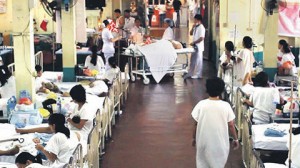WHO calls for phaseout of mercury in medical devices
MANILA, Philippines – The World Health Organization and Health Care without Harm have launched a new initiative to remove mercury from medical devices, including thermometers and blood pressure measuring gauges, by 2020.
According to a statement posted on the WHO website, the phaseout will be done by ending the manufacture, import and export of those devices and by supporting the deployment of accurate, affordable, and safer non-mercury alternatives.
Mercury is considered by the WHO as one of the top 10 chemicals of major health concern. Small amounts of exposure or ingestion can cause serious health problems, including for a child in the womb.
Its toxic effects include damage to the brain, kidney and lungs, skin and eyes. Other symptoms of mercury poisoning include headaches, insomnia, memory loss, muscle weakness and impairment of speech, hearing and walking. At higher doses, it could cause kidney and respiratory failure.
Last August, a mercury spill occurred inside the Dr. Jose Fabella Memorial Hospital in Manila, prompting authorities to order a cleanup that required the transfer of at least 40 patients from the pediatric ward.
The initiative Mercury-Free Healthcare by 2020, recently launched to mark the signing of the Minamata Convention on Mercury at a United Nations conference in Japan, calls for the phaseout of mercury fever thermometers and blood pressure devices containing mercury.
While the Minamata Convention allows countries to continue to use mercury in medical devices until 2030 under certain special circumstances, WHO and the nongovernmental organization Health Care without Harm believe that the potential negative health consequences from mercury are so great that all should strive to meet the main target date of 2020 set out in the Convention.
“With the signing of the Minamata Convention on Mercury we will be going a long way in protecting the world forever from the devastating health consequences from mercury,” said WHO director-general Dr Margaret Chan in the statement.
RELATED STORY
Mercury spill at Manila’s Fabella hospital
